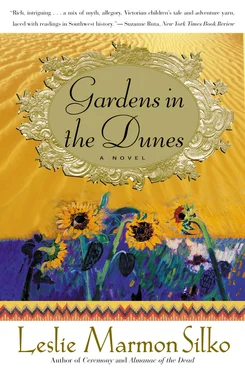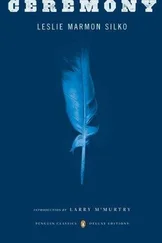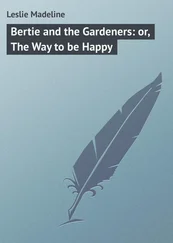How long had it been — two winters almost, wasn’t it? Sister Salt nodded. People here were afraid to dance because of the soldiers and Indian police. But if the people would just dance like before, then the Messiah and the dancers would return.
Maytha and Vedna were waiting for her across the street. They’d come into Needles to buy nails and check the town dump for pieces of scrap wood or tin they might use for their new house. They paid to ride on the back of the freight wagon that carried the mail between Parker and Needles twice a week; it was a two-day ride from Road’s End to Needles, so they had to bring along their own water and food. The little black grandfather began to twist around in his bundle impatiently, and Sister Salt was about to excuse herself to go when the old Walapai woman put a hand on her arm.
“Wait! I’ve got important news for you,” she said, “about your little sister.” Sister Salt’s heart pounded as she listened. Two days before, the Walapai woman saw Indigo get off the eastbound train; at first she didn’t recognize her because she’d grown so much, and she wore fine new clothes and shoes. But it was her! She carried a colorful caged bird, and a funny furry creature clung to one arm; she was accompanied by a rich white man and woman with a great deal of luggage. They left the station in a rented buggy.
The woman’s Walapai sisters agreed; they’d seen them too. But other Indian women, mostly Havasupai and Mojave, came over to disagree with the Walapai women. They said not to listen to her; the old Walapai woman had been crazy since she was kicked in the head by a cavalry horse, and her Walapai sisters drank too much beer.
Sister Salt politely thanked the old woman and her sisters; were they mistaken as the others said? Indigo was at boarding school in California, not with a white couple; she must have seen another girl. Deep down though, she felt hope and excitement; what if the Walapai women were right?
Later Sister showed the twins the place along the river just south of town where their lean-to had been; the ring of blackened stones that marked their hearth was still there, but nothing else. On trips to Needles with Big Candy, Sister used to avoid the place; for a long time she couldn’t even bring herself to look directly at the high sandy hill above the riverbank where the Messiah and his family fled that morning. Instead she glanced at the hill from the corner of her eye, afraid that if she looked directly at it, she might cry.
After the dancers were arrested, all the shelters were torn down and burned. The Walapai women and the others relocated to the dry wash behind the train yard, so they had the riverbank by the town dump to themselves. But now, with the little bright-eyed grandfather in her arms, she felt heartened to be at the place they last were all together and happy, even if it was Needles. In the midday glare of the sun, the sandy slope of the hill looked different than it had that morning after dawn when the raiders came.
The days were shorter now, and the nights were cool. In a few more months the snowstorm clouds would return to the mountain peaks, and with them the Messiah and his family and the dancers. If the people gathered here and danced again, the Christ and the others would return, and Mama with them.
The twins suggested they camp there until they caught the mail wagon back to Road’s End. As she lit the fire on the same hearth Mama and Grandma had used, she felt happy. But as the night wore on, she was saddened only the circle of burnt stones remained. Big Candy was gone, and with him went the help she needed to find Indigo. All the money she saved for the search and their return to the old gardens was gone. Damn money! She hated it but needed it too.
God damn that Mexican woman and all her dogs! God damn the war that sent her their direction! Sister knew better than to talk to strangers, but Delena seemed so nice. Although Big Candy didn’t accuse her or the twins of aiding the thief, still in his mind they were connected, and that was enough. Even if Big Candy caught up with the woman and got back the money, Sister doubted she would ever see him again.
So much for the Sand Lizard notion that sex makes allies of strangers. She had months of sex with Candy but lost him as her ally anyway; he went off crazy after that Mexican woman and the money. Money! You couldn’t drink it or eat it, but people went crazy over it.
That night the little grandfather snuggled against her breasts and talked to her as she slept. When she woke herself answering him, she found his black shining eyes gazing at her; the approach of dawn was milky gray across the east horizon. He wanted to return to the old gardens. Money wasn’t necessary there — all the food the two of them needed could be gathered there. His little auntie, Indigo, would return there — she wouldn’t forget the way home.
She pulled her shawl snuggly around them both, and adjusted the old blanket across her legs, careful not to wake Maytha and Vedna, both snoring softly nearby. As sunrise approached, she watched the light touch the slope of the high sandy hill, and imagined the Messiah and the others slowly descending the slope, ankle deep in the sand. But the angle of the sun was wrong — still too steep this time of the year — and she knew she could not see the Messiah and the others yet.
The twins stocked up on the things they’d need to live at Road’s End — everything cost so much. The twins were good to her and shared their food without reproach or meanness, so Sister made herself useful by staying at their campsite with the little grandfather to guard the supplies the twins already bought. She bundled him onto her back and searched along the river for wild onions and watercress; she dug up cattail roots to boil for soup.
She was grateful now for all the meat and grease Big Candy fed her because her fat made milk for the baby even if she didn’t have much to eat. He was getting so big and plump now and he could lift himself up and roll over; but the expression in his gleaming black eyes was still piercing and cranky, like that of an old man. He wanted to return to Sand Lizard country, away from the river dampness that caused fevers.
Bright Eyes she called him one day when he was gurgling and smiling on his blanket — he loved to feel the air on his bare bottom. She wanted to buy cotton cloth and a wool blanket to keep him cozy the coming winter, but she had no money. When they got back to Road’s End, she would cut and soak yucca leaves and try to make little yucca baskets the way Grandma Fleet had — in shapes of turkeys or dogs; then she could bring the baskets to sell at the depot every two or three months. She practiced braiding and tying willow bark while Bright Eyes slept.
The day before the mail wagon left for the south, while the twins were busy tying bundles and packing, Sister went to visit the old Walapai woman a last time. Road’s End was so far from any place — she didn’t expect to get back to Needles again for months, and she wanted to see if the head injury really had affected the old Walapai woman, the way the others alleged. What if Indigo had returned with the rich white people?
Earlier she heard a westbound train arrive, so Sister looked for the women on the outdoor platform of the station. But when she saw the tourists flock around the women to buy their strings of cedar berry seeds, three for a penny, Sister stopped.
She was about to turn to leave when two tourists surprised her from behind and asked her and “the papoose” to pose for their camera. Sister started to turned away from them but out of the corner of her eye she saw a silver dollar between the white man’s fingers. She’d seen only lucky gamblers with silver dollars; the workers used to pay her for walks along the river with nickels and dimes. Sometimes it might take her two days to earn a dollar, but she had fun naked and laughing along the river with the men.
Читать дальше












